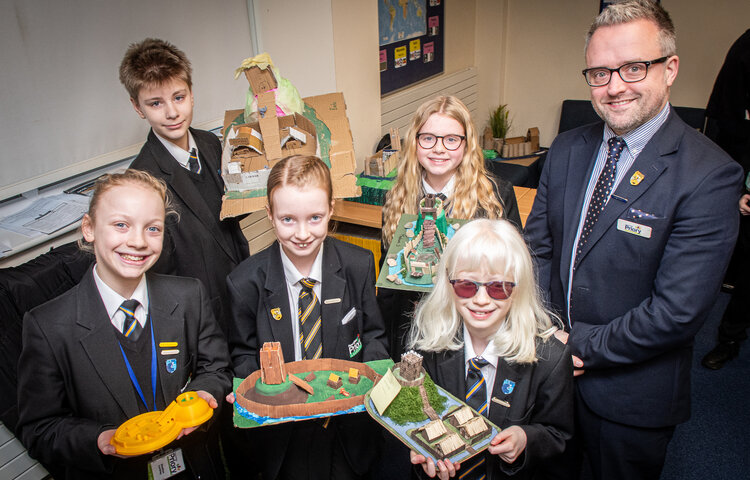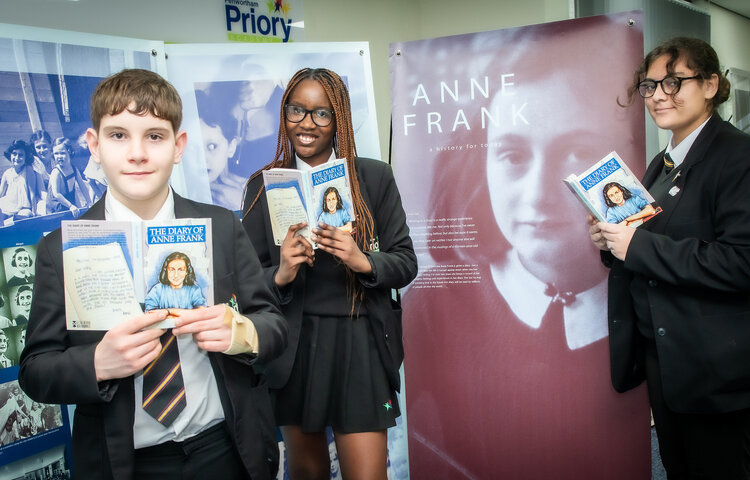History
Curriculum Philosophy
“Those who do not learn the lessons of the past are condemned to repeat them.”
It is more important than ever, in our ever-shifting world, that we understand the importance of History within the school curriculum. In an era of ‘fake news’ and divisive politics, we must educate our students in the mechanisms that have constructed the modern world. Key concepts such as democracy, parliament, revolution and significance play an important role in understanding the world we live in. Students need to engage with a range of topics from within British and world history that equip them with the character and culture they need to cope and thrive with the twenty first century. The curriculum on offer in the History Department is as good or better than Lancashire Agreed Syllabus and is tailored to the needs of Priory students.
Intent
The History Department believes in these core principles:
- Students should develop a passion and interest in the subject during their five years at the school. This will be facilitated through first time Good or better teaching that provides engaging lessons for all abilities.
- The curriculum offered to students should be accessible to all but provide students with opportunities to be challenged, to think hard and have their learning extended. This will encourage students to use their initiative and, where possible, find out answers for themselves. This will involve reference to fiction and non-fiction texts which they can use to extend their learning.
- Students should be equipped with the necessary analytical and evaluative skills that are needed in the modern world. They should learn to question the provenance of opinions and evidence and learn to assess what they show them about different topics from different historical periods.
- Students should be given access to a wide-ranging curriculum that covers significant elements in British history and the wider world. This will support prior learning at KS2 and provide them with a platform for further study at KS5.
- Students will be instructed in key historical concepts such as parliament, revolution, democracy, causation, significance, and change & continuity.
- Students will develop their leadership, organisation and communication skills by recognising the importance of key terminology within the subject, as well as being given opportunities to complete a range of range of written and oracy tasks.
The History Department will aim to ensure that all students:
- have detailed knowledge and understanding of the history of Britain as a coherent, chronological narrative (sequence), from the earliest times to the present day: how peoples’ lives have shaped this nation and how Britain has influenced and been influenced by the wider world.
- know and understand significant aspects of the history of the wider world: the nature of ancient civilisations; the expansion and dissolution of empires; characteristic features of past non-European societies.
- gain and deploy a historically grounded understanding of abstract vocabulary such as ‘democracy’, ‘revolution’, ‘empire’, ‘civilisation’, ‘parliament’ and ‘peasantry’
- understand historical concepts such as change and continuity, cause and consequence, similarity, difference and significance, and use them to make connections, draw contrasts, analyse trends, frame historically valid questions and create their own structured accounts, including written narratives and analyses.
- understand the methods of historical enquiry, including how evidence is used rigorously to make historical claims, and discern how and why contrasting arguments and interpretations of the past have been constructed History – key stage 3
- gain historical perspective by placing their growing knowledge into different contexts, understanding the connections between local, regional, national and international history; between cultural, economic, military, political, religious and social history; and between short- and long-term timescales. This will involve visits to historical sites and the use of outside speakers.
- gain an understanding of how their local community has been influenced by historical continuity and change, as key aspects about the history of Preston and Lancashire are re-visited and woven into the schemes of learning.
- learn to retrieve key information by using repeated practice of knowledge and skills, spaced retrieval practice and low-stakes testing.
- learn vital skills that prepare them for the world of work. Links to LORIC will be made throughout schemes of learning, in order to develop those skills desired by employers, colleges and training providers. Careers within the discipline and how the subject can complement and support future opportunities is made clear to students during their time at Priory.
Teachers of History
Mr A Eccles - Lead Teacher of History
Mrs M Cauchi - History Teacher
Mr I Momoniat - Humanities Teacher
Lessons
Year 7 - two hours of History per week
Year 8 - two hours of History per week
Year 9 - two hours of History per week
Year 10 - three hours of History per week
Year 11 - three hours of History per week
History Implementation Documents
Implementation
This will be carried out in the following way:
- Clear overview of curriculum from Years 7 to 11 showing cumulative development of knowledge strands based on threshold concepts. Students will receive two hours per week in Years 7 to 9, with three hours per week at GCSE.
- Clear overview of curriculum within each key stage and each year, showing the sequence of learning.
- Shared and consistent lesson structures with accompanying resources.
- Coherent step-by-step sequences that build on existing knowledge and allow incremental development of knowledge.
- Access to broad and deep factual knowledge that allows them to use a range of thinking skills, including those that are deemed to be ‘higher order’ skills such as analysis and evaluation.
- Focus on learning – changes to long term memory – not performance. This will be implemented through the use of low stakes testing and interleaving.
- Explicitly teaching new tier two and tier three vocabulary
- Unrelenting focus on key concepts.
- Embedded regular retrieval practice and spaced practice
- Embedded and consistently applied homework focused on knowledge retrieval.
- ‘Close the gap’ by building and retaining long term knowledge in PP students.
Impact
- Assessment and feedback should be a fixture of every lesson – this may take many forms: questioning, verbal feedback, self-assessment, etc.
- Marking – books should be marked in line with department policy.
- Embedded assessment tasks within sequences of learning.
- Twice/thrice annual examinations in line with school policy. These should be cumulative, including all learning to date within that key stage.
- No significant gap between PP and non-PP students.
History Implementation Documents
History Curriculum
Attainment and Progress (national tests and assessments)
2024 GCSE History Outcomes
|
Subject |
9 - 7 % |
9 - 5 % |
9 - 4 % |
| History |
12 |
31 | 55 |
Destinations
House Competitions
The History Department run a series of competitions throughout the academic year. For pupils in Key Stage Three, there is a castle design competition at the end of HT2, as well as a poster competition for Black History Month. In collaboration with Geography and RE we ask pupils to participate in the Humanities reward postcard design competition.
Trips and Visits
The History Department offers trips at KS3 to Lancaster Castle and Quarry Bank Mill as part of the pupils programme of study. At KS4 there is a trip to Thackray Medical Museum to support pupils’ study of Health & The People, c.1000-present. In 2025, there will be a KS3 foreign trip to the battlefields of the Western Front.
Guest Speakers and Workshops
There is a workshop for pupils to visit in Year 8 that allows them to visit a virtual WW1 trench. Pupils use VR headsets to study life in a WW1 trench, assessing the perils of fighting on the frontline. Bi-annually our Year 9 pupils have the opportunity to engage in presenting an exhibition on behalf of the Anne Frank Trust. Pupils have an opportunity to become Anne Frank Ambassadors.
Volunteering Opportunities
Pupils will have the opportunity from September 2024 to become librarians for the Humanities library.
Cultural Experiences
Starting in the Summer term of 2024, pupils will be offered cultural visits to locations in the Penwortham and Preston areas. Sites will include places of historical significance such as churches and historic buildings.
Where can studying History take you?
Related News
Building the Past: Year 7’s Impressive Castle Models
An extraordinary amount of effort, planning and skill has gone into the Year 7 annual competition.
Anne Frank Exhibition Brings The Past To The Present
Year 9 pupils have been guiding younger pupils through the story of Anne Frank to highlight the dangers of intolerance and hatred.


